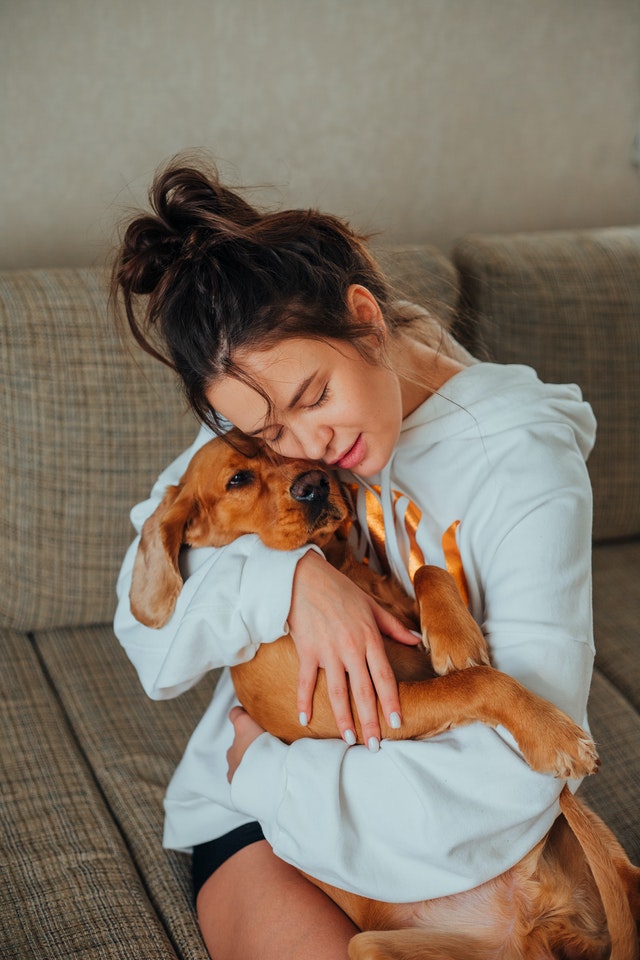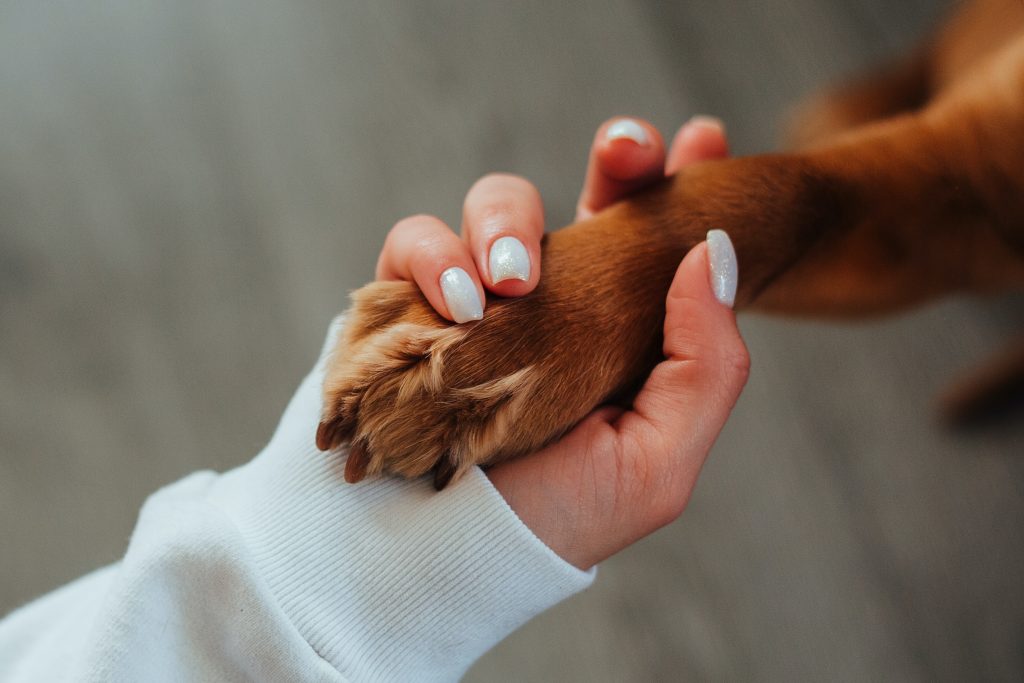Vacuuming the house is one of those chores that nobody particularly enjoys…Especially not your precious pup(s)!
You might have noticed that even your dog has some type of allergic reaction whenever a vacuum cleaner is switched on. They would either flee the house, run into another room, or start barking viciously at this unwelcome intruder.
If you are very lucky, your dog might want to play with the vacuum cleaner.
While this is preferable to a dog trying to escape to another universe when he or she sees a vacuum cleaner in action, it can be very distracting to have one of them playfully rip off the vacuum cleaner’s guts while you are trying to rid the carpets of that very same animal’s hair.
That inevitably raises the question: why exactly is my dog scared of vacuum cleaners?
Below we try to explain the reasons behind what some clever dog expert has dubbed ‘zuigerphobia’, i.e. being scared of vacuum cleaners – and suggest a few ways to deal with that.
Why Vacuum Cleaners Drive Some Dogs Nuts
One actually doesn’t need a PhD. in dog psychology to understand why so many dogs bark at vacuums, try to rip them apart, or collapse on the floor in a nervous bundle when they hear one approaching.
In the first place, dogs have much more sensitive ears than most humans.
To understand what an approaching vacuum cleaner sounds to your dog, therefore, you should multiply that sound by several multiples. Let’s assure you, it’s scary.
Combine that with the fact that your dog has no idea what this thing that makes such a terrible noise actually is and you’ll start to get a better idea of what he or she might be going through when this UHO (Unidentified Howling Object) approaches him or her.
Secondly, vacuum cleaners also often have a rather peculiar smell.
In addition, some vacuums might have a variety of different smells, some of which your pup very likely despises.
If you take into account that smelling is your dog’s primary sense, he or she can probably smell things in that vacuum cleaner that you and I have no idea are there.
We’ve already touched on the third reason why the average dog treats a vacuum cleaner like an alien intruder: to them, it is actually an alien intruder. Not only does it make a horrible noise, and smells strange, but it also looks like nothing else they have ever encountered.
The fact that most of us only vacuum the house once or twice a week – and if we are bachelors even less than that – means the dog doesn’t really get a chance to become friends with the vacuum cleaner. It departs as quickly as it appeared, leaving in its wake the fearful memories of something very strange.
What Are The Signs That Your Dog Is Scared Of A Vacuum Cleaner?
We’ve already covered the common symptoms of zuigerphobia or fear of vacuum cleaners. The dog will either start barking and try to attack the intruder, or it will run away as far as it could. There are other, sometimes more subtle symptoms though.
1. Peeing or Pooping:
It’s not by chance that your dog accidentally pees or poos in the house whenever it’s vacuuming day. Just like human kids can sometimes have an ‘accident’ when they face something very scary, the same can happen to a dog. Please, dear dog owners, this is a nervous response and not a sign of a disobedient or ‘naughty’ animal. So please treat it correctly.
Although there are plenty of options for pet urine carpet cleaners, it’s best to avoid it entirely if you have the capacity.
2. Starting To Act Very Strange:
Dog experts refer to this type of behavior as ‘hyperarousal’.
The dog would start acting in a very unusual manner, jumping up and down, trying to catch his or her own tail, whining, panting, humping, etc. These are all related to the nervous reaction triggered by the arrival of an alien intruder, i.e. the animal becomes hyperaroused.
3. Freezing in Their Tracks:
In this case, we’re not talking about the dog simply lying down on the couch and starting to watch TV. We are referring to an animal that literally freezes in its tracks from sheer fright. Some of them will even start trembling, while others will begin to walk in slow motion, not unlike a midnight ghost.
4. Other Subtle Signs Of Fear:
Most dog owners understand that their dog is scared or at least very uncomfortable when it tucks its tail between its legs. But do you know the other subtle signs that your dog is getting very uncertain of him or herself?
The list includes a furrowed brow, pursed lips, tightened mouth, ears that are pinned right back, showing the whites of their eyes, not looking you into the eyes, licking their lips, yawning, trembling, lifting a front paw, or a lowered body posture.
What Would Make A Dog Afraid Of A Vacuum Cleaner That’s Been There A Long Time?
Consider this scenario: you might have a dog and a vacuum cleaner. If you think about it, having a dog with no vacuum is probably quite uncommon!
The two might have interacted quite peacefully in the past. Why would your dog suddenly start showing signs of extreme fear when the vacuum cleaner is switched on?
Once again one should remember that, much like humans, dogs form memories and associations based on past experiences.
If you or the cleaner, for example, one day suddenly switch on the vacuum cleaner right next to your dog, he or she might get such a scare that it will become ingrained in their memory, from where it will trigger a fearful reaction every time the vacuum cleaner is switched on.
Age also plays a role.
Puppies are known to go through ‘fearful phases’ when they are particularly vulnerable to things that scare them. A bad experience during this time will linger in their memories for a very long time and can cause reactions that humans will find hard to understand. For most puppies, these fearful periods are between the ages of 3 and 4 months and again between 5 and 12 months.
Older dogs often have similar problems. If your beloved family dog is around 15 years old, it’s time to start treating him or her like a grandpa or grandma. Would you start up the vacuum cleaner right next to your grandpa when he is having his afternoon nap in his favorite chair? Unless you are a covert sadist, the answer is surely no!
The same rules should apply when you use noisy machinery like a vacuum cleaner in the presence of your aging family dog. Their hearing is most likely not so good anymore, and they might not be able to determine the origin of such a loud noise as easily as you. So wake them up gently, and perhaps take them to the next room before you start up the vacuum cleaner.
Some Dogs Find Certain Types Of Vacuum Cleaners Scarier Than Others
A quite interesting phenomenon is that not all dogs find all vacuum cleaners equally scary.
To a large extent, your dog’s reaction to a particular type of vacuum cleaner will be determined by their memories of encounters with this type of cleaning apparatus in the past. You might, for example, find that your dog used to be totally OK with the family’s old canister-type vacuum cleaner but since you’ve bought that expensive new upright model, he or she goes out of their mind the moment you switch it on.
Luckily the reverse can also be true: while your previous vacuum cleaner might have scared your beloved four-legged friend to the point of a nervous breakdown, you might find that he or she will accept a different model quite readily.
Does anyone really know what determines whether a particular type of vacuum cleaner will scare a dog (or not)? Probably not. But what we do know is that dogs are often frightened by strange noises, shapes, and smells.
Above all else, it’s probably a safe bet that if you get a quiet vacuum cleaner, there’s a better chance your dog will tolerate it.
If you currently have an upright vacuum cleaner, therefore, try experimenting with a canister-type model next time. The smaller, less threatening shape might put your dog’s mind at ease. Try to find something that makes less noise than the previous version.
An alternative option could be to buy a robot vacuum. They are quieter than most other models, and also more compact. As such, the chances are better that your best friend won’t need psychiatric treatment after being “threatened” by it the first time.
However, if you’re looking for something that can handle all of their fur/hair, a robot vacuum will still be limited in comparison to something like an upright.
If you decide on a robot vacuum, the best option is to introduce your dog and the vacuum cleaner to each other while the latter is still switched off. Allow the dog to smell, lick, and push around the vacuum cleaner as much as he or she wants. It will help to make them understand that it’s not a threat.
Next time take the dog and the vacuum cleaner to a fairly big room. Switch on the vacuum cleaner in one corner while you play a game with your dog in the other corner. The goal here is to desensitize the animal to the presence of the (working) vacuum cleaner.
How You Can Help Your Dog To Peacefully Coexist With A Vacuum Cleaner:
Management Technique:
We’ve already partly covered this in one or two of the above sections. The aim is simply to avoid forcing the dog and a running vacuum cleaner into the same confined space and hoping they will become friends.
Simply take your dog to another room on the other side of the house or apartment while you are vacuuming. If you have a yard, that’s even a better option. Or let someone in the household take him or her for a walk.
Desensitize Your Dog:
This involves introducing the dog to the vacuum cleaner in manageable chunks. Let’s say the lounge is your dog’s favorite room. Then simply bring in the vacuum cleaner one day and place it near him or her without switching it on. Nothing more.
Next time do the same – but now manually move the vacuum around a bit while the dog is watching you. Don’t switch it on yet.
The next day you could try switching on the vacuum cleaner in the next room and see how the dog reacts. If you are worried it will be too much too soon, you can search Google for sounds of a running vacuum cleaner and play it to your dog at a fairly low volume. Do this several times, until the dog isn’t perturbed by it at all.
Pleasant Associations:
What you are trying here is to associate the sound of a running vacuum cleaner with something pleasant. Place the vacuum cleaner in the corner, turn it on and then give your dog one of his or her most favorite treats. Make sure it’s something really special. Some dogs, for example, love fish skin or peanut butter.
Order And Structure:
While your dog might not perceive time in the same way we as humans do, they do nevertheless like a structured, orderly environment because (just like many humans) they are actually creatures of habit.
One way in which you can use this to your advantage is by having a regular vacuuming session at the same time on the same day or days every week. Your dog will eventually form its habits around it.
When you do this, however, you should keep in mind the dog’s own schedule.
If he or she is eating and you suddenly start up the vacuum cleaner, their immediate reaction would be that they are being attacked – and they would respond accordingly. Your dog might even attack your vacuum!
Choose a fixed time every week, for example, 10 am every Saturday. The dog will gradually become accustomed to the sights and sounds of a vacuum cleaner at that time on a Saturday, and start relaxing.
What You Can Do If Your Dog Attacks The Vacuum Cleaner
This is a potentially very dangerous situation, both for the dog and the vacuum cleaner. We suggest that you immediately start using a management technique such as your spouse taking the dog for a walk while you continue vacuuming the home. If that is not possible, keep the dog in a separate room.
Over time you can introduce desensitizing techniques and try to create pleasant associations – but don’t force it. A final resort is to buy a different type of vacuum cleaner, e.g. a robot cleaner. Or try to borrow your neighbor’s one so you can first get an idea of whether or not your dog will react any differently to the newcomer.


